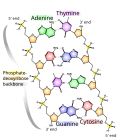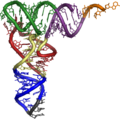Francis Crick
Francis Crick (8 June 1916 – 28 July 2004) was a British molecular biologist, biophysicist, and neuroscientist. He is most noted for being a co-discoverer of the structure of the DNA molecule in 1953 with James Watson. He, Watson, and Maurice Wilkins were jointly awarded the 1962 Nobel Prize in Physiology or Medicine "for their discoveries concerning the molecular structure of nucleic acids and its significance for information transfer in living material".
Early Life and Education[edit]
Francis Crick was born on 8 June 1916 in Northampton, England. He studied physics at University College London and later worked as a scientist for the British Admiralty during World War II. After the war, he studied biology.
Career and Research[edit]
In 1947, Crick began studying biology and became part of an important group of researchers at the Cavendish Laboratory at the University of Cambridge. It was here that he and James Watson discovered the structure of DNA in 1953. Their work built upon the findings of other scientists, including those of Rosalind Franklin and Maurice Wilkins.
Crick also proposed the sequence hypothesis and the central dogma of molecular biology, which are foundational to our understanding of genetics and the function of cells.
Later Life and Death[edit]
In his later years, Crick shifted his research focus to neuroscience and attempted to advance the scientific understanding of human consciousness. He died of colon cancer on 28 July 2004.
Legacy[edit]
Crick's work has had a profound impact on the field of biology, particularly in the study of genetics and the understanding of the human genome. His contributions to science and his influence on the field continue to be recognized and celebrated.
See Also[edit]
- DNA
- James Watson
- Maurice Wilkins
- Nobel Prize in Physiology or Medicine
- Rosalind Franklin
- Cavendish Laboratory
- University of Cambridge
- University College London
References[edit]
<references />
Ad. Transform your life with W8MD's Budget GLP-1 injections from $75


W8MD offers a medical weight loss program to lose weight in Philadelphia. Our physician-supervised medical weight loss provides:
- Weight loss injections in NYC (generic and brand names):
- Zepbound / Mounjaro, Wegovy / Ozempic, Saxenda
- Most insurances accepted or discounted self-pay rates. We will obtain insurance prior authorizations if needed.
- Generic GLP1 weight loss injections from $75 for the starting dose.
- Also offer prescription weight loss medications including Phentermine, Qsymia, Diethylpropion, Contrave etc.
NYC weight loss doctor appointmentsNYC weight loss doctor appointments
Start your NYC weight loss journey today at our NYC medical weight loss and Philadelphia medical weight loss clinics.
- Call 718-946-5500 to lose weight in NYC or for medical weight loss in Philadelphia 215-676-2334.
- Tags:NYC medical weight loss, Philadelphia lose weight Zepbound NYC, Budget GLP1 weight loss injections, Wegovy Philadelphia, Wegovy NYC, Philadelphia medical weight loss, Brookly weight loss and Wegovy NYC
|
WikiMD's Wellness Encyclopedia |
| Let Food Be Thy Medicine Medicine Thy Food - Hippocrates |
Medical Disclaimer: WikiMD is not a substitute for professional medical advice. The information on WikiMD is provided as an information resource only, may be incorrect, outdated or misleading, and is not to be used or relied on for any diagnostic or treatment purposes. Please consult your health care provider before making any healthcare decisions or for guidance about a specific medical condition. WikiMD expressly disclaims responsibility, and shall have no liability, for any damages, loss, injury, or liability whatsoever suffered as a result of your reliance on the information contained in this site. By visiting this site you agree to the foregoing terms and conditions, which may from time to time be changed or supplemented by WikiMD. If you do not agree to the foregoing terms and conditions, you should not enter or use this site. See full disclaimer.
Credits:Most images are courtesy of Wikimedia commons, and templates, categories Wikipedia, licensed under CC BY SA or similar.
Translate this page: - East Asian
中文,
日本,
한국어,
South Asian
हिन्दी,
தமிழ்,
తెలుగు,
Urdu,
ಕನ್ನಡ,
Southeast Asian
Indonesian,
Vietnamese,
Thai,
မြန်မာဘာသာ,
বাংলা
European
español,
Deutsch,
français,
Greek,
português do Brasil,
polski,
română,
русский,
Nederlands,
norsk,
svenska,
suomi,
Italian
Middle Eastern & African
عربى,
Turkish,
Persian,
Hebrew,
Afrikaans,
isiZulu,
Kiswahili,
Other
Bulgarian,
Hungarian,
Czech,
Swedish,
മലയാളം,
मराठी,
ਪੰਜਾਬੀ,
ગુજરાતી,
Portuguese,
Ukrainian






